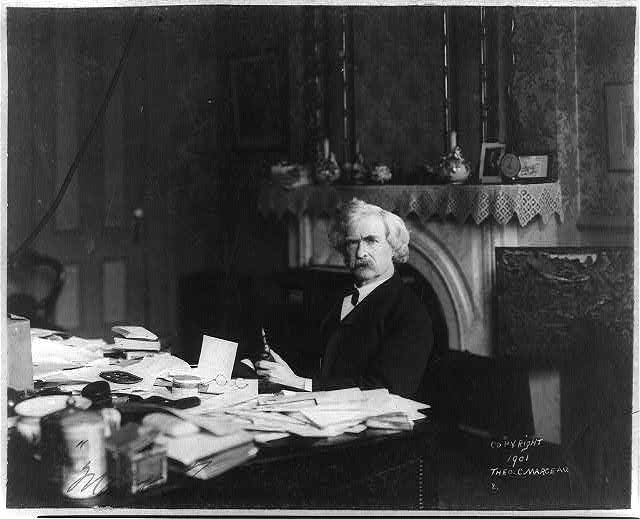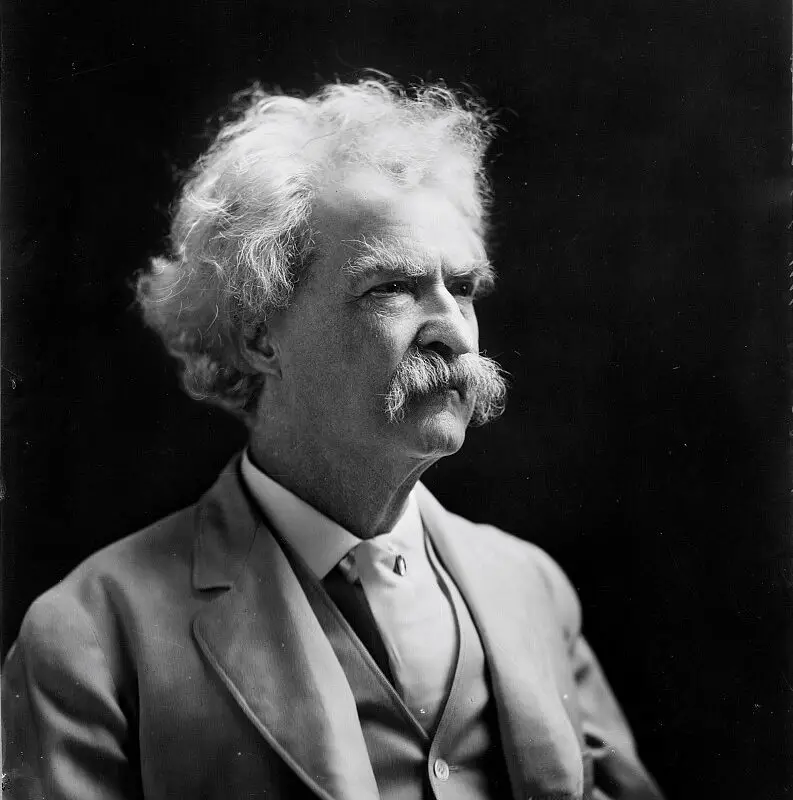A Voice That Defined an Era
Mark Twain, born Samuel Langhorne Clemens in 1835, is one of the most beloved and iconic figures in American literature. Best known for his masterpieces The Adventures of Tom Sawyer (1876) and Adventures of Huckleberry Finn (1885), Twain’s humor, wit, and keen social commentary captured the essence of the American experience like no other. But Twain’s influence extended far beyond his famous novels. During the early 20th century, when many expected his career to wane, Twain continued to be a literary force, publishing works like What Is Man? (1906), a philosophical exploration of human nature. This is the story of Twain’s enduring impact on literature and his legacy as one of the sharpest voices in American history.
Early Life: From Riverboats to Writing
Before Twain became a household name, he lived an adventurous life that shaped his unique perspective on society. Born in Missouri, Twain grew up along the Mississippi River, which later became a central setting in many of his works. As a young man, he worked as a riverboat pilot, a miner during the Gold Rush, and even a Confederate soldier for a brief period. It was during his time as a reporter for newspapers in Nevada and California that Twain first began experimenting with his writing style, blending humor and satire in his tales of the American frontier.
Twain’s early experiences traveling the country and observing the nuances of life along the Mississippi River provided the rich material that he would later immortalize in his most famous works. His early success with humorous short stories like “The Celebrated Jumping Frog of Calaveras County” in 1865 propelled him into the literary world, but Twain was never content with mere entertainment. His writing grew increasingly sophisticated, weaving sharp social commentary with humor, which resonated deeply with readers.
Twain’s Masterpieces: Capturing the American Spirit

By the late 1800s, Twain had firmly established himself as one of America’s premier authors. The Adventures of Tom Sawyer and Adventures of Huckleberry Finn are often cited as quintessential depictions of life along the Mississippi River, but they are much more than that. These novels explore the complexities of human nature, morality, and the American experience. Twain’s use of regional dialect, vivid descriptions of life in the South, and his portrayal of race relations in Huckleberry Finn challenged the conventions of literature at the time.
Huckleberry Finn, in particular, is often credited as the first “Great American Novel.” Through the eyes of Huck, a runaway boy, and Jim, an escaped slave, Twain examined themes of freedom, friendship, and the moral dilemmas of a society steeped in racism and hypocrisy. Twain’s ability to criticize the injustices of his time while maintaining a light, humorous tone made him a master of satire, and his work continues to inspire debates about its relevance and significance today.
A Later Career and Philosophical Writings: What Is Man? and Twain’s Reflection on Humanity
As Twain grew older, his writings took on a more introspective and philosophical tone. The publication of What Is Man? in 1906 marked a departure from his earlier, more playful works. Written in the form of a dialogue between a young man and an older, wiser mentor, the book delves into questions of human nature, free will, and morality. Twain, who had long been known for his irreverent humor and sharp social critiques, revealed a more serious, reflective side in this work. He argued that humans are essentially machines, driven by external forces rather than free will.
This shift toward philosophy mirrored Twain’s own personal struggles during his later years. He faced the deaths of several close family members, including his wife Olivia and his daughter Susy, and these losses profoundly affected his worldview. Twain’s writing became darker and more cynical, though always infused with his characteristic wit. What Is Man? may not have been as commercially successful as his earlier works, but it showcased Twain’s intellectual depth and continued relevance as a thinker and writer.
A Man of Many Faces: Humorist, Satirist, and Social Critic
Though Twain is often remembered for his humor, he was also a biting social critic who did not shy away from addressing the moral and political issues of his time. His essays, lectures, and even his novels frequently tackled subjects like slavery, racism, imperialism, and the corrupting influence of wealth. His fierce opposition to imperialism was most evident in works like The War Prayer (written in 1905 but unpublished until after his death), in which he condemned American military interventions abroad.
Twain’s sharp critiques of authority and social norms were often softened by his humor, but his messages were no less powerful. His works spoke to the contradictions within American society—the ideals of freedom and equality clashing with the realities of racism, exploitation, and greed. Twain used his platform to raise awareness about these issues, making him not only a beloved author but also a moral voice for justice and change.
Personal Struggles and Legacy: The Man Behind the Persona
Behind Twain’s famous white suit and public persona as the witty storyteller was a man who grappled with deep personal struggles. The loss of family members, financial troubles, and his own declining health took a toll on Twain in his later years. Nevertheless, he remained a prolific writer and public figure, delivering lectures and continuing to publish his works until the very end of his life.
Twain’s humor and wit often masked the pain he felt, but they also served as a tool for coping with the harsh realities he observed in the world. Despite his personal hardships, Twain maintained his sense of humor and his belief in the power of storytelling to reveal truth. He died in 1910, leaving behind a body of work that would continue to inspire and entertain generations of readers.
A Lasting Influence: Twain’s Impact on Literature and Culture
Mark Twain’s influence on literature and culture cannot be overstated. His works remain some of the most widely read and studied in the English language, and his style of using humor to tackle serious social issues has inspired countless writers. Twain’s ability to capture the complexities of American life—its contradictions, its struggles, and its spirit of adventure—made him a true American icon.
Today, Twain’s works continue to resonate with readers around the world. His sharp social critiques remain relevant, and his exploration of the human condition is timeless. Whether through the eyes of Huck Finn, Tom Sawyer, or the characters in his later philosophical works, Twain’s observations about humanity, morality, and society still provoke thought and spark conversation.



